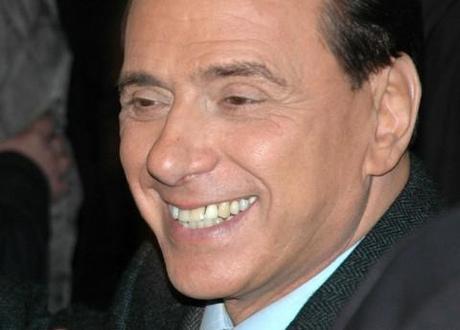
Silvio Berlusconi won't be smiling much longer. Photo credit: Roberto Gimmi, http://www.flickr.com/photos/rogimmi/2415926378/
The economy finally accomplished what years of scandals, prosecutions, and diplomatic gaffes couldn’t: Silvio Berlusconi, Italy’s longest-serving prime minister and the man who once called himself the “Jesus Christ of politics”, is stepping down after losing his majority in a key budget vote in Parliament on Tuesday.
Berlusconi, 75, promised to resign as soon as Parliament passes an urgently needed package of budget reforms aimed at shoring up Italy’s flailing, debt crisis-stricken economy and restoring eurozone confidence. The Prime Minister, who has served for 17 years, doesn’t see that happening until the end of this month. Berlusconi’s party, the centre-right People of Freedom party, wants new elections, believing that no other majority is possible; the opposition disagrees and wants a national unity government. Either way, Berlusconi is out after the budget reforms pass – he has already said that he won’t stand in another election.
Italy, the eurozone’s third largest economy, has suffered mightily from the eurozone debt crisis and its own profligacy. Saddled with sluggish growth, a massive debt mountain topping €1.9 trillion (£1.63 trillion; $2.6 trillion) and 120 percent of GDP, and, it appears, political instability, Italy is in trouble; even worse, a lack of confidence in Berlusconi’s ability to push through austerity reforms and navigate the crisis have forced Italy’s borrowing costs to an unsustainable level.
So, will Berlusconi’s departure pave the way back to health?
Shares up on news of Berlusconi’s resignation. European shares rallied on Wednesday on the news of Berlusconi’s imminent departure, cruising on hopes that a new leader would tackle Italy’s massive debt more aggressively,Reuters reported. But, the news agency cautioned, uncertainty over Italy’s new leadership means that this rally is tentative at best.
But he could come back. Berlusconi is, by all accounts, a wily political survivor and opposition leaders were quick to caution that the media tycoon could be back, The Guardian reported. “[He] has not disappeared. He has resigned,” Pierluigi Bersani, leader of Italy’s biggest opposition group, the Democratic party, told the paper, while Antonio Di Pietro, of the Italy of Principles party, declared that Berlusconi was “taking another month to try to buy a few [parliamentarians]“. Berlusconi has said, however, that he will not stand in Italy’s next elections.
Who is Berlusconi? A brief time-line of the media baron’s political career, provided by The Guardian.
Berlusconi’s leaving won’t help. Berlusconi’s exit won’t be the panacea that markets and investors are perhaps hoping for, Reuters, speaking to European economic analysts, reported. “Italian assets rallied briefly on rumors Berlusconi was ready to quit on Monday, but there will be no sustained market reversal until he is replaced by a stable government seen as capable of shoring up public finances and tackling reforms,” the news agency found. “That may be a long time coming, and perhaps the biggest risk since its bond yields began to rise in the summer is how long Italy takes to deal with its problems.”
“When asked if they would like to have sex with me, 30 percent of women said, ‘Yes’, while the other 70 percent replied, ‘What, again?’” said Berlusconi, on his reputation as a ladies’ man. This, after responding to sex scandal allegations with “It’s better to like beautiful girls than to be gay.”
Italy’s problem isn’t Berlusconi, it’s the euro. The Daily Telegraph, in a leading editorial Wednesday, warned, “Yet while Mr Berlusconi may preside over an economy that is essentially corrupt, it is not clear that his removal will bring anything more than short-term relief. There is no reason to believe that whoever succeeds him will be any more capable of delivering the demanded reforms.” Berlusconi, for all his ridiculousness, presided over one of the more stable Italian governments and his departure may mean a return to political turbulence; plus, it was at least philosophically in favour of free market reforms. Italy’s real problem is its membership in the euro: “Its membership of the single currency means Italy cannot reboot its economy through the mechanisms of devaluation and inflation. It is instead condemned to extended austerity, deflation and rising unemployment.”
Why wait? An emergency government is best. “The sooner Berlusconi quits, the better. What matters most is to avoid, as far as possible, any further delay and uncertainty,” declared the editors of Bloomberg in a leading editorial. Berlusconi, who seemed largely indifferent to his country’s burgeoning debt crisis and who dozed off during the G20 meetings in Cannes this weekend, has shredded any credibility he once had – “and, in a crisis of confidence, credibility is all.” The best thing to do now is for Berlusconi to leave now, not after passing this austerity package, and for Italy to appoint an emergency government.
“Life in Italy is life in a prosperous country. We see that on every occasion, consumption has not gone down, the restaurants are full, you have trouble booking seats on aeroplanes, holiday areas are totally booked out on long weekends,” Berlusconi attested in November of this year. Italy, however, holds the second largest debt burden in the eurozone, after Greece.
Berlusconi – victim of the EU’s ‘hideous strength’. Berlusconi has survived allegations of soliciting underage sex, of bribery and political manipulation, claims of tax fraud and Mafia links, and even being hit in the face with a statue thrown by an angry Milinese man. “Yet he underestimated the EU’s hideous strength” and“the awesome power of the EU to subvert the internal democracy of its member nations,” declared Daniel Hannan, a Conservative MEP writing for The Telegraph. Berlusconi believed that Brussels would do anything to keep the euro together, including ponying up more cash to serve Italy’s debts if reform alone wasn’t enough. “It was the same calculation that George Papandreou had made, and his fate was the same; the same, indeed, as that of every leader since Margaret Thatcher to have found himself on the wrong side of the Brussels combine harvester.”
Berlusconi’s most memorable blunders

